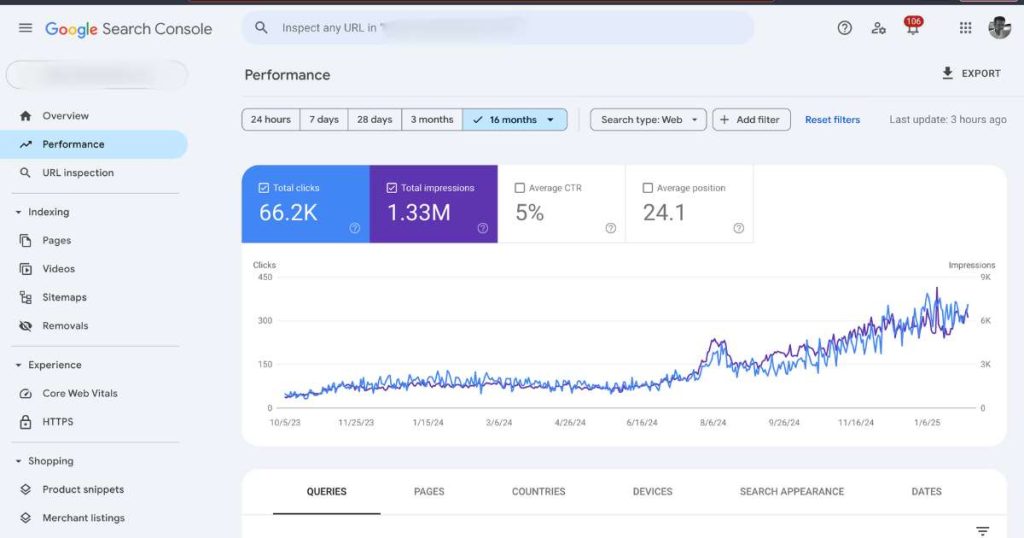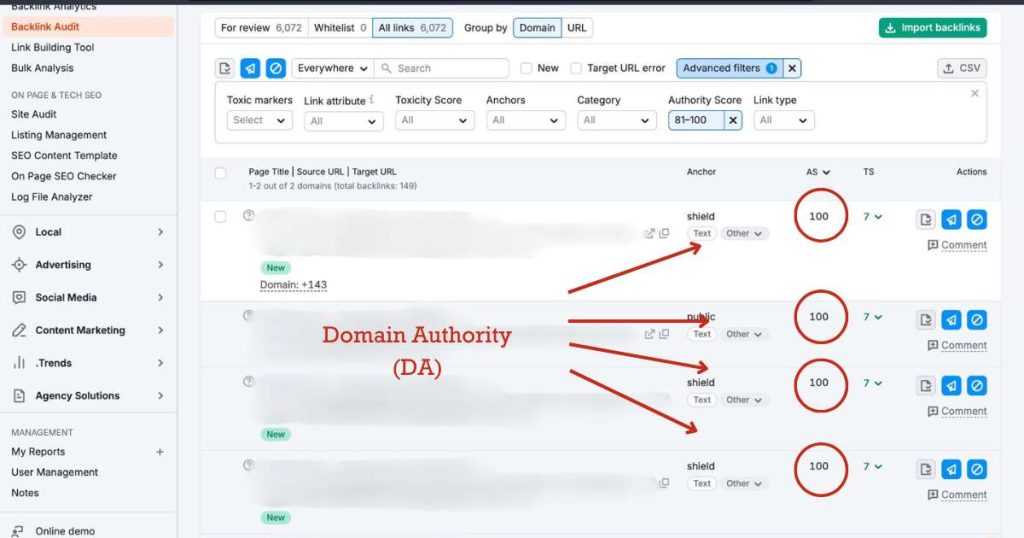Why SEO in Thailand Matters in 2025
Three months ago, Simon, the owner of a small boutique hotel in Bangkok, was struggling to fill his rooms. Despite offering excellent service, his website barely received any visitors, and his online bookings were almost non-existent. Frustrated, he considered increasing his ad spend, but his budget was tight. That’s when he discovered the power of SEO in Thailand. By optimising his website, targeting the right Google Thailand search keywords, and improving his online presence, Simon’s business saw a 250% increase in organic traffic. Today, his hotel is fully booked most weekends—all thanks to a solid Thailand search engine optimisation strategy.

This image from Google Search Console highlights how SEO strategies can significantly increase website traffic. Studies show that businesses implementing strong SEO techniques can experience up to a 250% boost in organic traffic.
Simon’s story isn’t unique. In 2025, the competition for online visibility in Thailand is fiercer than ever. With over 60 million internet users and Google dominating the search market, businesses that fail to rank high risk being invisible to potential customers. Whether you run a local restaurant in Sukhumvit, an e-commerce store, or a tech startup, appearing on the first page of Google Thailand can mean the difference between thriving and barely surviving.
The Thai digital landscape is evolving rapidly. More consumers are turning to Google Search, Google Maps, and voice search to find products and services. Mobile-first indexing, AI-driven search algorithms, and localisation have made SEO a non-negotiable strategy for businesses in Thailand. Simply having a website isn’t enough—you need to ensure that your site is optimised, fast, mobile-friendly, and packed with valuable content that aligns with Thai search behaviours.
In this guide, we’ll break down the latest SEO strategies that will help your business rank higher and attract more customers in Thailand—fast. Whether you’re new to SEO or looking to refine your approach, this is the ultimate roadmap to success in 2025.
Keyword Research: Finding the Right Keywords for Thailand SEO

Keyword research is the foundation of any successful SEO strategy in Thailand. Choosing the right keywords can determine whether your website attracts high-intent customers or simply gathers irrelevant traffic that doesn’t convert. To rank effectively on Google Thailand, you need to understand keyword intent and how Thai users search for products and services online.
1. Understanding Keyword Intent: Transactional vs. Informational Searches
Not all searches are created equal. Users in Thailand typically fall into two main categories:
- Informational searches – Users looking for knowledge, guides, or tutorials. Examples:
- “How to start a business in Thailand”
- “Best places to visit in Bangkok”
- “What is SEO?”
- Transactional searches – Users ready to take action, such as making a purchase or booking a service. Examples:
- “Buy organic skincare Thailand”
- “SEO agency Bangkok”
- “Cheap flights to Phuket”
To rank high and convert visitors, businesses should target a mix of both, focusing on transactional keywords for sales and informational keywords for brand awareness.
2. Best Tools for Finding Thailand-Specific Keywords
To identify the most relevant search terms for your business, use these SEO tools:
- Google Keyword Planner – Free tool to find keyword volume, competition, and trends.
- Ahrefs – Great for competitor analysis and uncovering high-ranking keywords in Thailand.
- Ubersuggest – Provides keyword ideas, search volume, and SEO difficulty insights.
These tools help you discover high-volume, low-competition keywords that can drive organic traffic.
3. Thai vs. English Keywords: What Works Best?
When targeting the Thai market, should you optimise for Thai or English search terms? The answer depends on your audience:
- Local Thai businesses (e.g., restaurants, retail shops, services) should prioritise Thai keywords, as most users search in their native language. Example: “คาเฟ่ใกล้ฉัน” (café near me).
- International businesses targeting tourists or expats can benefit from English keywords. Example: “Best beach resorts in Thailand”.
- Bilingual SEO is often the best approach. Having pages optimised for both Thai and English can expand your reach.
Final Tip:
Keyword research isn’t a one-time task. Regularly update your keywords based on trends, seasonality, and changing user behaviour to maintain high rankings on Google Thailand.
On-Page SEO: Optimising Your Website for Google Thailand

1. Best Practices for Title Tags, Meta Descriptions, and Header Optimisation
Google Thailand prioritises relevant, well-structured content with clear keywords. Follow these best practices:
✅ Title Tags: Keep them under 60 characters, include your main keyword, and make them compelling.
📌 Example: “SEO Thailand: How to Rank Your Business on Google Fast”
✅ Meta Descriptions: Write a concise summary (150-160 characters) that includes a CTA and keywords.
📌 Example: “Boost your website’s Google Thailand ranking with proven SEO strategies. Learn more today!”
✅ Header Optimisation (H1, H2, H3):
- Use H1 for your main page title (e.g., Best Digital Marketing Services in Thailand).
- Structure content with H2s and H3s for clarity.
- Naturally integrate LSI keywords (related terms like “Thailand search engine optimisation” or “rank on Google Thailand”).
2. Content Localisation: Thai vs. English for Better Rankings
One major decision for businesses in Thailand is whether to write content in Thai or English.
- Targeting Thai consumers? Prioritise Thai-language content. Google Thailand ranks Thai search queries higher for local intent.
- Reaching tourists or expats? English content works well, especially for industries like hospitality and real estate.
- Best approach: Use both Thai and English to capture a wider audience.
Pro tip: If using both languages, structure URLs properly (e.g., example.com/th/ for Thai and example.com/en/ for English).
3. Internal Linking Strategy and Content Structuring for SEO
Internal linking helps distribute SEO authority across your website and improves user experience.
🔗 Best practices for internal linking:
- Use descriptive anchor text (e.g., Read our complete guide on SEO in Thailand instead of Click here).
- Link to high-value pages (e.g., service pages, blogs, or case studies).
- Maintain a clear site hierarchy (homepage → category pages → blog posts).
By implementing these on-page SEO techniques, your website will be well-optimised to rank higher on Google Thailand and attract more local traffic.
Local SEO: Getting Found by Thai Customers

If your business relies on local customers in Thailand, Local SEO is essential for appearing in Google search results, Google Maps, and local business directories. With the right optimisation strategies, you can attract nearby customers searching for your products or services.
1. Optimising Google My Business for Thailand Search Rankings
Google My Business (GMB) is one of the most powerful tools for local SEO in Thailand. A well-optimised GMB profile increases your chances of appearing in the Google Local Pack (the top three business listings shown for location-based searches).bv
🔹 Steps to optimise your GMB profile:
✅ Claim & verify your listing on Google My Business.
✅ Use an accurate business name, address, and phone number (NAP) that matches your website.
✅ Select relevant categories (e.g., “Thai Restaurant,” “Digital Marketing Agency”).
✅ Add high-quality photos of your business, products, or services.
✅ Encourage customer reviews—Google favours businesses with positive, frequent reviews.
✅ Post updates regularly (promotions, events, and announcements).
📌 Example: A restaurant in Bangkok with an optimised GMB profile, good customer reviews, and frequent updates is more likely to appear when someone searches for “best Thai food near me”.
2. Getting Listed in Local Directories
Aside from GMB, Thai consumers rely on local business directories to find trusted services. Listing your business on these platforms improves local visibility and SEO rankings.
🔹 Top local directories in Thailand:
- Wongnai – Popular for restaurants, cafes, and hotels.
- Pantip – A well-known Thai forum where users discuss businesses.
- Thai SMEs Directory – Great for small and medium-sized businesses.
- Yellow Pages Thailand – Traditional but still valuable for local SEO.
Ensure your business information is consistent across all platforms to build credibility with Google Thailand.
3. Importance of Thai Backlinks and Citations from Trusted Local Site
Backlinks from authoritative Thai websites signal to Google that your business is reputable. Focus on earning quality links from Thai blogs, news sites, and industry-related platforms.
🔹 How to get high-quality Thai backlinks:
✅ Guest posting on Thai business blogs and industry sites.
✅ Sponsoring local events to get featured on their websites.
✅ Collaborating with Thai influencers and bloggers for mentions.
✅ Submitting press releases to Thai news websites.
Citations (mentions of your business name, address, and phone number) from trusted Thai directories and media sites further strengthen your local SEO presence.
Final Thoughts:
By optimising Google My Business, getting listed in local directories, and earning Thai backlinks, your business can rank higher on Google Thailand and attract more local customers. Whether you’re a restaurant, retail store, or service provider, investing in local SEO will ensure long-term visibility and growth.
Technical SEO: Speed, Mobile Optimisation, and UX

Technical SEO is the backbone of website performance, directly impacting rankings on Google Thailand. A fast, mobile-friendly, and well-structured website improves user experience (UX) and helps search engines crawl and index your content more efficiently. Here’s what you need to focus on.
1. Why Page Speed is Crucial for Google Thailand Rankings
Google considers page speed a key ranking factor. A slow website leads to higher bounce rates, meaning users leave before engaging with your content—something Google interprets as a poor user experience.
🔹 How to improve page speed:
✅ Use a Content Delivery Network (CDN) – Ensures faster load times for users in Thailand.
✅ Compress images using tools like TinyPNG or ShortPixel.
✅ Enable browser caching to speed up returning visits.
✅ Minimise JavaScript and CSS files to reduce load times.
✅ Choose a fast, reliable hosting provider (preferably with servers in Thailand or Asia).
📌 Fact: Google recommends a page load speed of under 2.5 seconds for optimal rankings.
2. Mobile-First Indexing and How It Affects SEO
Thailand is a mobile-first country, with over 90% of internet users accessing websites via smartphones. Google now indexes and ranks websites based on their mobile version first, meaning a poorly optimised mobile site can hurt rankings.
🔹 Mobile optimisation checklist:
✅ Use a responsive design that adapts to all screen sizes.
✅ Ensure text is readable without zooming.
✅ Avoid intrusive pop-ups that disrupt mobile users.
✅ Test mobile usability with Google’s Mobile-Friendly Test.
📌 Tip: AMP (Accelerated Mobile Pages) can enhance mobile performance for news and blog content.
3. Site Structure, Schema Markup, and Structured Data
A well-organised site helps both Google and users find information easily.
🔹 Best practices for site structure:
✅ Use a clear hierarchy (Homepage → Categories → Subcategories → Individual Pages).
✅ Implement breadcrumb navigation for easier user navigation.
✅ Keep URLs short, descriptive, and keyword-rich (e.g., example.com/seo-thailand-tips).
🔹 Schema Markup & Structured Data:
Adding structured data helps Google understand your content better, improving rich snippets and search visibility.
✅ Use LocalBusiness schema for Thai businesses.
✅ Implement FAQ schema to appear in Google’s featured snippets.
✅ Add Review schema to enhance click-through rates (CTR).
Final Thoughts
Optimising for speed, mobile experience, and structured data is essential for ranking on Google Thailand. A fast, mobile-friendly, and well-structured site ensures higher engagement, better SEO rankings, and more conversions.
Link Building Strategies for SEO Success in Thailand

Link building remains a powerful ranking factor for Google Thailand. High-quality backlinks from authoritative Thai websites signal trust and relevance, helping your site rank higher. However, not all backlinks are equal—focusing on quality over quantity is key. Below are the best strategies to build strong, Thailand-specific backlinks for SEO success.

This image from SEMrush highlights the power of high Domain Authority (DA) backlinks in boosting search rankings. Websites with DA 80+ or 100 pass strong SEO value, improving credibility and visibility on Google Thailand.
1. How to Acquire High-Quality Thai Backlinks
Google prioritises backlinks from relevant, authoritative, and locally trusted sites. Here’s how to get them:
🔹 Partner with local businesses – Get backlinks by collaborating with complementary businesses (e.g., a hotel linking to a local tour company).
🔹 List your business in Thai directories – Sites like Wongnai, Thai SMEs Directory, and Pantip provide valuable local backlinks.
🔹 Engage in industry forums – Answering questions on Pantip or Thai Facebook groups can lead to natural backlinks.
🔹 Sponsor local events – Events often feature sponsors on their official websites, providing authoritative backlinks.
📌 Tip: Avoid spammy backlinks from low-quality sites. Google’s algorithms can penalise unnatural link-building practices.
2. Guest Blogging on Authoritative Thai Websites
Guest blogging is an excellent way to earn relevant, high-authority backlinks while boosting brand visibility.
🔹 How to find guest blogging opportunities in Thailand:
✅ Identify high-traffic Thai blogs in your niche (e.g., travel, finance, marketing, or e-commerce).
✅ Reach out with valuable, locally relevant content ideas.
✅ Write high-quality articles that naturally include a link to your website.
✅ Ensure your guest post follows the editorial guidelines of the site.
📌 Example: If you run a digital marketing agency, writing a guest post on a popular Thai business blog about “SEO trends in Thailand” with a link back to your services can drive targeted traffic and improve rankings.
3. The Importance of Social Signals and Brand Mentions
While social media links don’t directly impact SEO, they influence brand visibility, engagement, and referral traffic—which Google considers in rankings.
🔹 Best ways to build social signals in Thailand:
✅ Leverage Thai social media platforms – Be active on Facebook, LINE, and TikTok, where most Thai users engage.
✅ Encourage content sharing – Blogs with shareable content (guides, infographics, and videos) attract organic backlinks.
✅ Build brand mentions – Even if a site doesn’t link back, a brand mention on a high-authority Thai site (e.g., a news portal) can improve credibility.
📌 Fact: Websites with high social engagement and strong brand presence tend to attract more organic backlinks, further strengthening Domain Authority.
Final Thoughts
A well-rounded link-building strategy in Thailand focuses on quality backlinks, guest blogging, and social signals. By earning links from trusted Thai sources, your website will gain higher search rankings, better credibility, and increased organic traffic.
Content Marketing: Creating Engaging & Shareable Content

Content marketing is a powerful tool for boosting SEO in Thailand, driving organic traffic, and increasing engagement. Thai internet users love video content, blogs, and social media, making it essential for businesses to create high-quality, shareable content that resonates with local audiences. Below are the best content strategies to enhance SEO and brand visibility in Thailand.
1. The Rise of Video Content & YouTube SEO in Thailand
Video consumption in Thailand is at an all-time high, with YouTube being the second most visited website after Google. Optimising video content can significantly improve SEO rankings and brand reach.
🔹 YouTube SEO Best Practices:
✅ Use Thai-language titles & descriptions – Helps rank better for local search queries.
✅ Optimise video metadata – Include Thai keywords, timestamps, and closed captions.
✅ Create engaging thumbnails – Eye-catching visuals increase click-through rates (CTR).
✅ Encourage comments & shares – Higher engagement improves YouTube rankings.
✅ Embed videos on your website – Boosts on-page SEO and keeps visitors engaged longer.
📌 Example: A Bangkok-based travel agency could create “Top 10 Hidden Beaches in Thailand”, optimised for YouTube search, attracting tourists and locals alike.
2. Blogging Strategies to Attract Thai Audiences & Boost Engagement
A well-structured blog improves Google Thailand rankings, drives organic traffic, and establishes authority. To make blogging work for Thai audiences, focus on highly relevant, engaging, and well-optimised content.
🔹 Key Blogging Strategies:
✅ Target trending topics – Use Google Trends Thailand to find popular search queries.
✅ Write in Thai & English – Cater to both local and international readers.
✅ Use long-tail keywords – Example: “Best street food in Bangkok 2025” instead of “Bangkok street food”.
✅ Format for readability – Use bullet points, short paragraphs, and clear subheadings.
✅ Include rich media – Add infographics, images, and videos to increase engagement.
📌 Example: A fitness brand in Thailand could write “Best Gyms in Bangkok for Expats & Locals”, targeting both Thai and English searchers.
3. Leveraging Social Media (Facebook, LINE, TikTok) to Drive Traffic & Backlinks
Thailand is a social media-driven market, with platforms like Facebook, LINE, and TikTok dominating daily interactions. Businesses that effectively leverage these platforms can drive website traffic, engagement, and backlinks.
🔹 Best Social Media Strategies for SEO:
✅ Share blog posts & videos – Promotes content visibility and social shares.
✅ Engage in Facebook Groups – Thai users actively seek recommendations and business insights.
✅ Use LINE for marketing – The most popular messaging app in Thailand, ideal for customer engagement & promotions.
✅ Create viral TikTok content – Short, engaging videos can boost brand awareness and generate backlinks.
📌 Fact: A viral TikTok video or widely shared Facebook post can lead to increased brand mentions, backlinks, and website visits, all of which improve SEO rankings.
Final Thoughts
A strong content marketing strategy in Thailand should focus on YouTube SEO, engaging blogs, and social media integration. By creating valuable, shareable content, businesses can rank higher on Google Thailand, attract more visitors, and establish long-term credibility.
Measuring SEO Success: Analytics & Tracking Performance
Implementing SEO strategies is only half the battle—tracking and analysing performance is key to ensuring long-term success. By using the right tools, businesses in Thailand can monitor keyword rankings, organic traffic growth, and make data-driven decisions to improve their Google Thailand rankings.
1. Using Google Search Console & Google Analytics for SEO Tracking
✅ Google Search Console (GSC) – Helps monitor search performance, keyword rankings, and website issues.
🔹 Key metrics to track:
- Search queries – Find out which Thai keywords bring the most traffic.
- Click-through rate (CTR) – Identify pages that need better title and meta description optimisation.
- Indexing issues – Ensure Google is properly crawling and indexing your website.
✅ Google Analytics (GA4) – Tracks user behaviour, engagement, and traffic sources.
🔹 Key metrics to analyse:
- Organic traffic – See how many users find your site through Google Thailand.
- Bounce rate – High bounce rates may indicate slow page speed or irrelevant content.
- Conversion rates – Measure how well your SEO efforts translate into leads and sales.
📌 Tip: Use UTM parameters in Google Analytics to track SEO campaign performance from different traffic sources.
2. Measuring Keyword Rankings & Organic Traffic Growth
Monitoring keyword rankings ensures your SEO efforts are moving in the right direction.
🔹 Best tools for tracking rankings:
✅ Ahrefs & SEMrush – Monitor Google Thailand keyword positions and competitor rankings.
✅ Google Search Console – See which keywords are improving or dropping in rank.
✅ SERP tracking tools – Use Local Rank Tracker for precise rankings in Thailand.
📌 Strategy: If a high-ranking keyword starts dropping, check if competitors updated their content—you may need to refresh your page.
3. Adjusting Strategies Based on Performance Data
SEO is an ongoing process. Regularly analysing data helps you identify weaknesses and optimise strategies.
🔹 When to adjust your SEO strategy:
✅ If organic traffic drops, check for Google algorithm updates or technical issues.
✅ If pages have low CTR, rewrite meta titles & descriptions to make them more compelling.
✅ If a blog post loses ranking, update it with new data, images, and keywords to regain position.
📌 Fact: Businesses that consistently track and adjust their SEO strategies see higher rankings and long-term growth.
Final Thought
By leveraging Google Search Console, Google Analytics, and keyword tracking tools, businesses in Thailand can monitor SEO performance and make data-driven improvements. Regular analysis ensures your website stays ahead of the competition and ranks higher on Google Thailand.
Conclusion: Fast-Track Your SEO Success in Thailand
Ranking high on Google Thailand requires a strategic, well-rounded SEO approach. From keyword research and on-page optimisation to local SEO, technical improvements, and link building, every element plays a crucial role in improving visibility and attracting more Thai customers.
To recap, here are the key SEO strategies that will help your business grow in Thailand:
✅ Keyword Research – Focus on high-intent Thai and English keywords to reach the right audience.
✅ On-Page SEO – Optimise titles, meta descriptions, and headers while ensuring Thai content localisation.
✅ Local SEO – Claim and optimise your Google My Business profile and list your business in Thai directories.
✅ Technical SEO – Improve site speed, mobile-friendliness, and structured data for better rankings.
✅ Link Building – Earn high-quality Thai backlinks through guest blogging, local partnerships, and social media.
✅ Content Marketing – Create engaging blog posts and video content to drive organic traffic.
✅ SEO Tracking – Use Google Analytics & Search Console to measure performance and refine your strategy.
The Thai digital landscape is evolving fast, and businesses that invest in SEO now will have a competitive advantage in 2025. Whether you’re a small business, e-commerce store, or service provider, implementing these SEO techniques will drive more traffic, leads, and sales.
🚀 Ready to dominate Google Thailand? Download our free SEO checklist or book a consultation with our SEO experts to fast-track your success today!
FAQs
How fast can I rank on Google Thailand in 2025? (New benchmarks & shortcuts)
- AI‑Optimized Content: Tools like SurferSEO or Frase now analyze top-ranking Thai pages—reverse‑engineer winning content in weeks.
- Authority Boosts: Buying expired Thai‑domain backlinks (via Ahrefs) can cut ranking time by 30–50%—but avoid spammy sites.
- Google’s “EEAT” Focus: Pages showing Experience, Expertise, Authority, and Trustworthiness (e.g., Thai client testimonials) rank faster.
Realistic Timeline: 1–3 months for low‑competition keywords (e.g., “organic skincare Phuket”); 6+ months for broad terms (“hotels in Bangkok”).
What makes Thailand’s SEO landscape unique in 2025? (Beyond language & mobile)
- “Near Me Now” Searches: Google prioritizes real‑time proximity—optimize for “open now” and GMB posts with live updates.
- Video & Visual Search: ~40% of Thai searches use images/video—optimize alt‑text for Thai and use YouTube Shorts.
- Local Apps Matter: Rankings pull data from Wongnai, Grab, LINE Maps—ensure your business appears there.
- AI Penalties: Generic AI content is downgraded—human‑edited Thai with local slang (e.g., “จุงเบย”) wins.
Thai vs. English keywords in 2025: What’s the smartest mix?
- Long‑tail phrases like “ซื้อiPhone15โปรโมชั่น” convert better.
- Use tools like Lokalise to discover trending Thai slang (“อลังการ”).
- Target expats/tourists with keywords like “best coworking space Bangkok” + LSI terms.
- Use multilingual schema markup so Google understands bilingual intent.
Which SEO tools are must-haves for Thailand in 2025? (Free & paid)
• Google’s SGE Insights (beta) – track AI‑generated snippet presence.
• Keyword Surfer – view Thai keyword volumes instantly.
Paid tools:
• Ahrefs Thai Database – updated backlink profiles for Thai sites.
• BrightLocal – hyper‑local rank tracking across Thai provinces.
• ChatGPT‑5 (Thai‑trained) – draft content, then human‑edit for flair.
How can I dominate local SEO in Thailand without a physical office? (New 2025 tactics)
- Virtual Address Hacks: Rent a virtual office (Servcorp Thailand) to list on GMB.
- Localized Content: Publish area guides like “Where Expats Buy Groceries in Bangkok.”
- Community SEO: Get featured on ThaiVisa or Facebook groups in “top of” posts.
- Voice Search: Optimize for Thai voice‑queries like “ร้านอาหารใกล้ฉันเปิดกี่โมง.”
[NEW] Will Google’s 2025 AI search (SGE) kill SEO in Thailand?
- Perspective Content: Google SGE pulls from Pantip threads—participate as experts.
- Visual Rich Snippets: Optimize images/videos for “how‑to” Thai queries (e.g., visa renewal).
- Brand Authority: Strong Thai backlinks (The Nation, Sanook) dominate AI‑generated results.
👉 Stat: ~70% of Thai SGE results still include traditional organic links—SEO isn’t dead, just evolving.


